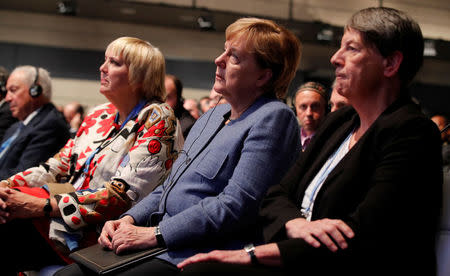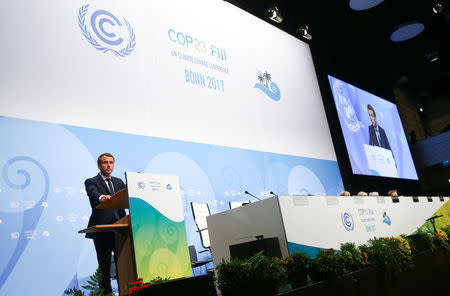EU ministers to look at climate deal amendment options without Poland: sources
By Nina Chestney BONN, Germany (Reuters) - The EU may need to find a way to ratify the global agreement that governs cuts in greenhouse gas emissions over the next three years without Poland, whose widespread use of coal to generate power may scupper its involvement, EU sources said. European Union environment ministers participating in a U.N. climate meeting in Bonn, Germany will on Thursday discuss options for ratifying the 2012 Doha Amendment, climate commissioner Miguel Arias Canete told reporters. The amendment forms a legal framework for CO2 reduction efforts until 2020, when the Paris climate agreement that more than 200 nations signed in late 2015 kicks in. Twenty seven of the EU's 28 member states have ratified it, with only Poland yet to do so. The EU needs unanimous backing from member states in order to ratify the amendment as a whole, but there is a possibility that the 27 could ratify it individually, excluding Poland, an EU official told Reuters. "This week, the level of EU ambition has been questioned because we have not ratified it," Canete told reporters. "We have already fulfilled all our commitments under the Kyoto Protocol but there is a symbolic value for developing countries." Canete said some member states wanted to deposit their ratifications individually. "That's what we will discuss tomorrow - what is the best way forward," he added. It was not immediately clear where a country-by-country ratification would leave the EU in terms of its commitments to the amendment, It extends the 2012 Kyoto Protocol, which is backed by almost 200 countries but not the United States. The Doha Amendment must be endorsed by at least 140 countries for it to come into force. As of the end of October, 84 countries had ratified it, according to the United Nations’ climate website. Last year Poland, which generates most of its electricity in outdated coal-fired power stations, said it was willing to back the ratification if the European Commission guaranteed financing for new, cleaner coal-fired plants. The oldest and least effective ones will have to be closed in coming years under EU regulations targeting emission cuts. To avert blackouts, Poland's government has accelerated its efforts to build new ones it says will reduce emissions. But the plan to stick to coal, which the government says will remain Poland's primary source of energy for years, is costly due to rising emission costs and the reluctance of banks to finance coal projects. Governments and diplomats from around the world are meeting in Bonn from Nov. 6-17 to work on the details of implementing the 2015 Paris Agreement, which succeeds the Kyoto Protocol and aims to end the fossil fuel era by 2100. On Tuesday, Estonian environment minister Siim Kiisler said he was sure EU ratification of Doha was imminent and would happen "in a matter of months, if not weeks". (editing by John Stonestreet)




